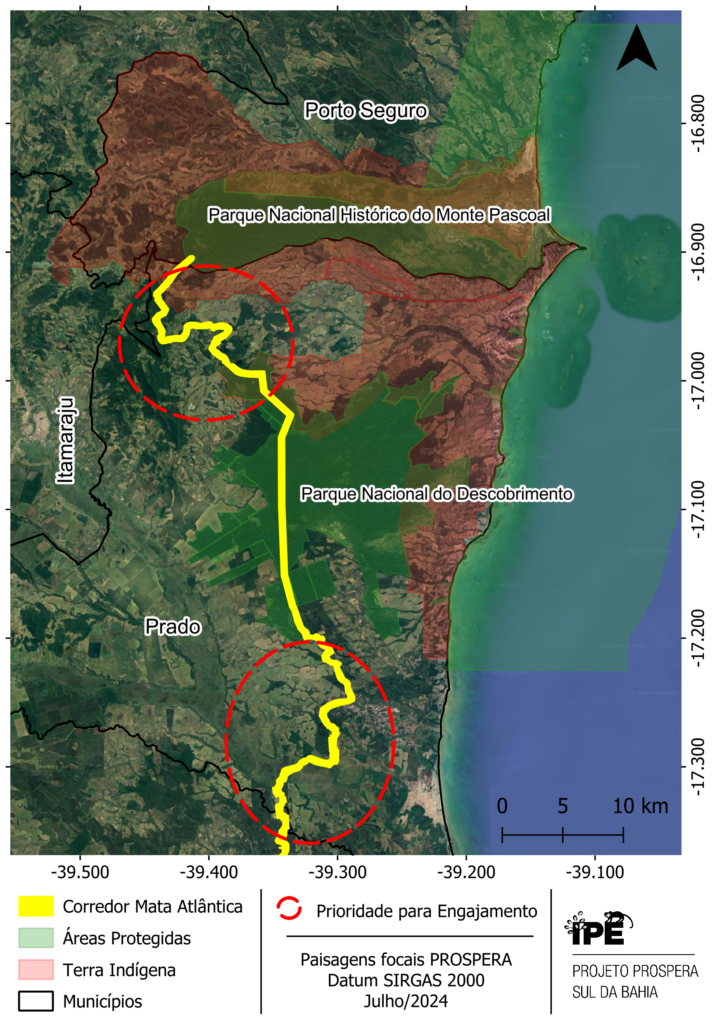Onde Estamos
Rod. Dom Pedro I, km 47
Nazaré Paulista, SP, Brasil
Caixa Postal 47 – 12960-000
Tel: (11) 3590-0041

In the far south of Bahia, IPÊ works with PROSPERA – a Project for Guided and Sustainable Restoration for Ecological Production, Environmental Regeneration and Increased Income. The initiative supports rural producers in planning land use to increase productivity, soil quality and water availability on their properties. The project also strengthens the local economy by developing sustainable production chains, sharing knowledge and promoting benefits for people through biodiversity conservation and climate improvement. All of this will be achieved through ecosystem restoration and productive recovery of a section of the Central Corridor of the Atlantic Forest, in the cities of Prado, Porto Seguro and Itamaraju.
This section of the central corridor was selected based on a study conducted by IPÊ called “Biodiversity Corridors – Paths for Building Sustainable Landscapes”. It crosses private properties, areas with family farming and Indigenous Lands. Rural landowners participate, and the focus is on planting and regenerating native forests in Permanent Preservation Areas and Legal Reserves, forming reconnection corridors between the following Conservation Units: Descobrimento National Park, with 22,000 hectares, and Monte Pascoal Natural Historical Park, with 22,500 hectares of area, in addition to Indigenous Lands, several Private Natural Heritage Reserves and other categories of Protected Areas. By promoting the environmental suitability of properties, with the implementation of sustainable production systems and ecological restoration, we will increase connectivity at the landscape scale in this area considered a global biodiversity hotspot.
The corridor strategy will also contribute to the recovery of spring areas and riparian forests and impact on water availability in rural and urban areas.
The proposal to connect forests arises from the need to reestablish the ecosystem and its interactions, generating more biodiversity with forest diversity, and regenerating living spaces for fauna species to be able to move from one forest to another, avoiding their isolation and increasing their chances of survival.
The main impacts of the project will be: maintenance of regional biodiversity, conversion of degraded areas into native vegetation and sustainable production, production of ecosystem services (water production, soil conservation, sedimentation control, maintenance of pollinators, biological control of pests and diseases, carbon storage and capture), social benefits (environmental suitability of rural properties, increased environmental awareness and engagement) and socioeconomic benefits (water and food security, increased productivity, socioeconomic resilience).
Sustainable improvement/management (i.e. certification, application of Good Agricultural Practices, etc.): 200 hectares
Protection: 825 hectares directly and 49,180 hectares indirectly (Conservation Units and Indigenous Lands)
Improvement/Sustainable Management: 20 hectares directly and 1,200 hectares indirectly
Restoration: 91 hectares
Maria Otávia S. Crepaldi
Erica Munaro
Mabel Ludka
Sabrina Weber
Isabela Waga
Mário Santana Cruz
Procter & Gamble (P&G)
Suzano Papel e Celulose
Environmental Leadership Training Initiative, Yale School of the Environment – ELTI/Yale
Rod. Dom Pedro I, km 47
Nazaré Paulista, SP, Brasil
Caixa Postal 47 – 12960-000
Tel: (11) 3590-0041
Termos de Uso | Estatuto
Copyright © Ipê – Instituto de Pesquisas Ecológicas.
Email: ipe@ipe.org.br